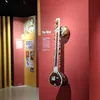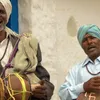From pandemic to positivity: how the Unbound exhibition celebrates the works of 45 artists online
In this three-part photo essay on the art exhibition curated by MG Dodammani, we showcase a range of creative works along with curator and artist insights.
Launched in 2014, PhotoSparks is a weekly feature from , with photographs that celebrate the spirit of creativity and innovation. In the earlier 490 posts, we featured an art festival, cartoon gallery. world music festival, telecom expo, millets fair, climate change expo, wildlife conference, startup festival, Diwali rangoli, and jazz festival.

Curated by MG Doddamani, an online exhibition featuring the works of 45 artists has been launched this month. Titled Oorja 2020 – Online Art Show, it will be held from August 15 to September 30. There are around 100 artworks for display and sale. See the exhibition website for more information on the artists, prices of artworks, and payment methods.
As the name suggests, Unbound represents resilience and positivity in the face of adversity. “It was born during the pandemic of 2020, born during the lockdowns. In spite of these challenges, it shows that the spirit of art cannot be bound or chained and is limitless,” says MG Dodammani, curator and artist, in a chat with YourStory.
The featured artists are from across Karnataka and other cities like Kolkata, Hyderabad, and Chennai. The artworks are priced from Rs 3,500 to Rs 1.5 lakh. The artworks will be sold unframed, but framing can be provided on request.
The artist lineup includes Jyoti Gupta, Kamal Ahmed M, Kanthi V, K T Shivaprasad, M G Doddamani, Mallamma Patil, Manjunath Honnapura, M N Murthy, Nagaraju P, Nagashayana Acharya, Nayana B, Neelam Malhotra, Nivedita Gouda, Prakash Babu, Rama Suresh, and many others.
MG Doddamani
“The pandemic has affected each and everybody. All fields are reeling under the disruption – be it labourers, businesses or creative people. It has become a big challenge to take forward our routine work,” says MG Dodammani.
For artists who cannot physically express themselves through their art shows, they have to explore virtual ways to deal with it – even though the feel of the original picture does not come through online. “While communication is possible, the personal touch is missing,” he observes.
This has particularly affected young artists and freelancers, since senior artists have the backing of their established works and brand name, and will survive these trying times. “As a curator, instead of sitting at home and feeling dejected, I thought I should explore the virtual way of communication to come out of the crisis,” Doddamani says.
Born in Gulbarga (Karnataka), MG Doddamani completed his BFA with first rank and a gold medal, and went on to get his MFA from Shantiniketan. He has won a range of awards from State Lalit Kala Academy and All India Fine Arts and Crafts Society (AIFACS).
His works are in many private and public collections in India and abroad. He has also organised and participated in art camps at the national and international levels. His earlier exhibitions include Oorja (see our coverage of the 2020 and 2018 editions).
“I chose the theme of drawings for the Unbound exhibition since they are basic and the mother route for paintings. There is a freedom to express through drawings, as paintings take more time,” Doddamani explains.
“Drawings are recordable primary sources bringing out artists’ experience on canvas more effectively than words,” he adds. The exhibition was also a social responsibility to artists to give them a chance to recreate the experiences they were going through, and share positivity through their drawings.
For the Unbound exhibition, he carefully handpicked 45 artists, with a mix of established and upcoming artists of promise, seniors as well as juniors. They used mediums like pastels, charcoals, pen, ink, and pencil. There are similar as well as complementary themes in the selected works, leading to an overall fluency and balance.
“I have changed my curation thinking process a little this time. I have included very young artists also, around the age of 18 years. Today’s younger generation will be tomorrow's masters,” Doddamani explains.
He regards ‘Gen Z’ as very creative, and their thinking process as very different especially because of their exposure to technology and science. “They not only think uniquely but move faster. Mixing junior with senior artists creates an environment of participative learning and inculcates responsibility,” he emphasises.
The younger artists will be driven to do better and engage more seriously with art when they share the stage with seniors. “As I myself am an artist, I know exactly how to combine the two based on my own experience,” he says.
Some artists are from smaller towns and villages. “Through college demos, presentations and art shows that I am constantly invited for, I take the chance to spot creative and dedicated individuals and earmark them for future opportunities, like this exhibition,” he proudly says.
Neelam Malhotra
“In these times, art is even more relevant. Beautiful and meaningful art is a treat to see and a window into another person’s mind,” explains Neelam Malhotra, a geography teacher by profession. She has taught extensively in schools for the underprivileged, and took up art after 25 years as a teacher (see our earlier showcase here).
“Art lovers are a great support to the artist community. Artists want their works to be seen and discussed, and purchased only if the viewer loves the art,” she explains. It is a big compliment to artists when the audience acknowledges ‘I see you, I see your work, I glimpse your thoughts.’
She asks: “Should we all not be holding each other’s hand and complimenting each other on whatever we do best when we have to pass through this terrible time together?”
For the Unbound exhibition, Neelam produced two ink pen and pencil works, titled Nature Unbound. “Due to reduction in human activity, or anthropause during the COVID-19 lockdowns, I noticed that nature is reinstating itself by regeneration,” she explains.
It is a joy for her to see the proliferation of plants, fluttering butterflies, chirping birds, buzzing bees, frogs and snails in her leafy neighbourhood. “Nature is fearlessly taking back its space,” she observes.
“One of my works is about plants growing gloriously, almost wildly. The second work depicts a woman’s head with her hair turning into matted dreadlocks, surrounded by flowers and butterflies. I like to see beauty even in this difficult period,” Neelam says.
Her passion for art has seen her through this long, stay-at-home and work from home (WFH) period. She also offers tips for aspiring artists.
“There are many among us who have the desire to learn art, but hesitate because they fear they have no talent. Let me clearly say there is more hard work involved than only talent. So pick up your colours, nature out there is your biggest teacher, for it’s never too late,” Neelam enthuses.
Chetana Ravi
“The ongoing COVID-19 phase has drastically affected humanity. The worldview of the entire population has changed for good. Humanity has begun to rethink the meaning of life,” explains Chetana Ravi.
She is a self-taught artist who is a graduate in electronics engineering. She has exhibited at Karnataka Chitrakala Parishath, Sublime Galleria, and India Art Festival (see our earlier showcase of her works here).
“Art has perfectly blended with these difficult times in realising the avowed purpose of human life. Many people, irrespective of age, have taken to drawing and painting during this lockdown period,” Chetana observes. Art has helped cope with mental distress and depression, and can increase body immunity.
Coping with the pandemic has turned out to be a great challenge for many artists. “The struggle to find a 'new normal' has posed serious problems in terms of reorienting the rhyme and rhythm of my workflow,” Chetana says.
“At the same time, this pandemic has offered new opportunities on the online front,” she adds. Artists get to interact with numerous other artists worldwide, and participate in many online art camps and exhibitions.
Geometry has been Chetana’s favourite subject form school and college days, and she painted three geometric series works for the Unbound exhibition. They are titled Complement (based on the principle of 'as above so below'), Aura (non-concentric circles based on seven energy levels), and Soul Search (an inward journey, depicted by triangles as the search engine).
“Hard times are only the other side of good times,” she explains, as advice for aspiring artists. “Hard times extract the best out of us,” she adds, citing the popular saying, ‘When the going gets tough, the tough gets going.’
“One must stay focused, keep working, and try new ways and techniques. We need to stay connected with friends and the outer world, and be hopeful,” Chetana emphasises.
Ajnabh Kiev
“During these unprecedented tough times, art can be one of the most effective and influential mediums. It can spread a message of hope, struggle and victory over an unknown unpredictable enemy such as COVID-19,” explains Ajnabh Kiev.
The atmosphere all around is full of pessimism, many patients are dying, and people from all strata are suffering financially and mentally. “Hence, a message via art could be instrumental in bringing about a motivational and inspirational change. A positive impact can be created by depicting stirring artistic ideas,” she says.
Ajnabh has a master’s degree in arts, and has been painting for eight years. She finds inspiration in fragments of nature held close for reflection, and has taken part in many group shows.
She herself has found it extremely challenging to cope with the uncertainty when the end is not near. “Suddenly your routine life has come to a standstill, and you are taken aback with devastating news all around impacting all of humanity,” she laments.
The message one needs to spread in such a high-pressure situation should be to do the best with given resources, she emphasises. Focusing on art helped her turn her mind to a different direction. “Technological advancements such as online exhibitions have certainly helped in connecting people, especially artists,” Ajnabh adds, calling for such online events to be held more often.
For the Unbound exhibition, she prepared sketches called Unrevealed and Afloat. Both share messages of hope. “My two cents to all budding artists is to bring about absolutely unseen passion from within, as if there is no tomorrow,” she suggests.
“Live for today. We can’t let our passion wait for tomorrow, as tomorrow could be more uncertain and unpredictable,” Ajnabh signs off.
Now, what have you done today to pause in your busy schedule and truly find your creative core in these hard times?















MG Doddamani
See also the YourStory pocketbook ‘Proverbs and Quotes for Entrepreneurs: A World of Inspiration for Startups,’ accessible as apps for Apple and Android devices.










![[Weekly funding roundup Jan 25-31] January sees modest VC inflow](https://images.yourstory.com/cs/2/220356402d6d11e9aa979329348d4c3e/Weekly-funding-roundup-1670592545805.png?mode=crop&crop=faces&ar=1%3A1&format=auto&w=1920&q=75)
